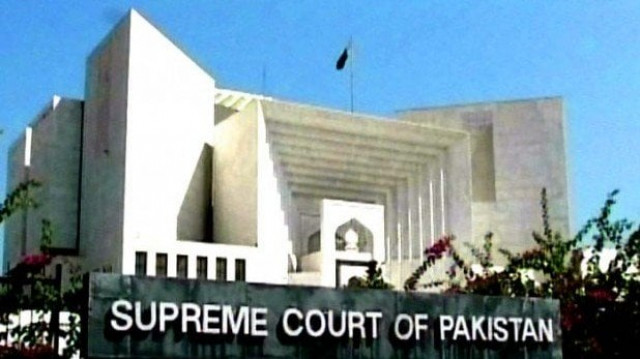SC expands scope of pre-arrest bail
Says lack of evidence, non-existence of sufficient ground enough for admitting such pleas

The Supreme Court has expanded the scope of pre-arrest bail, declaring that the power of the superior courts to grant such bails – first and foremost – must be examined in the constitutional context of liberty, dignity, due process and fair trial and as a check on police power.
"Pre-arrest bail is in the nature of a check on the police power to arrest a person.
“The non-availability of incriminating material against an accused or non-existence of a sufficient ground including a valid purpose for making arrest of the accused person in a case… would as a corollary be a ground for admitting the accused to pre-arrest bail, and vice versa," said a five-page judgment.
The verdict was authored by Justice Syed Mansoor Ali Shah, who, as a part of a three-judge bench also including Justice Manzoor Ahmad Malik and Justice and Aminuddin, granted a pre-arrest bail to an accused in a murder case.
The order said courts’ reluctance to grant pre-arrest bail and treating such a relief as an extraordinary one without examining if there is sufficient incriminating material to connect an accused with the offence and if arrest is required during investigation or trial does not appear to be correct.
The court also took exception to the courts’ insistence on showing mala fide on part of the complainant or the police for granting pre-arrest bail, especially after recognition of the right to fair trial as a fundamental right under Article 10A of Constitution of Pakistan, 1973.
It said protection against arbitrary arrest and detention is part of the right to liberty and fair trial.
"This court has, in many cases, granted pre-arrest bail to accused after finding that there are no reasonable grounds for believing in their involvement in the commission of the offences and has not required independent proof of mala fide on part of police or complainant before granting such relief."
The court said despite non-availability of incriminating material, his implication by a complainant and insistence of police to arrest him are circumstances which by themselves indicate mala fide on part of the complainant and the police, and the accused need not lead any other evidence to prove mala fide.
It noted that a police officer has – under Section 54 of the Code of Criminal Procedure (CrPC) – the power to arrest a person involved in any cognizable offence or against whom a complaint is made or credible information is received or a reasonable suspicion exists of his having been so concerned.
"Having the power to arrest is one thing but the justification for the exercise of that power is quite another. A police officer who makes an arrest of a person must be able to justify the exercise of that power in making the arrest apart from his having the power to do so.
“He cannot make an arrest of a person only because he has the power to do so. He must also show sufficient grounds for making the arrest," said the order.
The court said Article 4(1)(j) of the Police Order, 2002 states this legal position when it prescribes that it is the duty of every police officer to "apprehend all persons whom he is legally authorised to apprehend and for whose apprehension sufficient grounds exist".
“And Rule 26.1 of the Police Rules, 1934 explains this by providing that the authority given under Section 54 of the CrPC to the police to arrest without a warrant is permissive and not obligatory.”
The court said as per the said rule whenever escape from justice or inconvenient delay in completion of the investigation or commencement of the trial is likely to result from the police failing to arrest, they are bound to do so, but in no other cases.
“Ordinarily no person is to be arrested straightaway only because he has been nominated as an accused in an FIR or in any other version of the incident brought to the notice of the investigating officer by any person until the investigating officer (IO) feels satisfied that sufficient justification exists for his arrest.
"The IOs should not mechanically make the arrest of a person accused of having committed a cognizable offence rather they must exercise their discretion in making the arrest of such person judiciously by applying their mind to the particular facts and
circumstances of the case.
“[The IOs also must be] consciously considering the question: what purpose will be served and what object will be achieved by arrest of the accused person," said the order.
Senior lawyers are welcoming Justice Shah’s judgment. They said the ruling is significant as some recent jurisprudence had limited the scope of such bails. The verdict, they hoped, will certainly be followed by the high courts to grant pre-arrest bails to innocent people
In March 2020, the Supreme Court had observed that pre-arrest bail cannot be granted in every “run-of-the-mill” criminal case as grant of this relief is an “extraordinary judicial intervention”.
"Grant of bail to an accused required in a cognizable and non-bail offence prior to his arrest is an extraordinary judicial intervention in an ongoing or imminent investigative process," read a two-page order authored by Justice Qazi Muhammad Amin Ahmed.
The order noted that the pre-arrest bail clogged the very mechanics of the state authority to investigate and prosecute violations of law designated as crimes.
"To prevent arrest of an accused where it is so required by the law is a measure with far-reaching consequences that may include loss or disappearance of evidence."
The court had noted that the remedy cannot be invoked in every run-of-the-mill criminal case prima facie supported by material and evidence, constituting a non-bailable/cognizable offence, warranting arrest, an inherent attribute of the dynamics of the Criminal Justice System with a deterrent impact.
Lawyers had not appreciated Justice Amin’s judgment, which, they said, had restricted the scope of pre-arrest bails and given more power to police.



















COMMENTS
Comments are moderated and generally will be posted if they are on-topic and not abusive.
For more information, please see our Comments FAQ